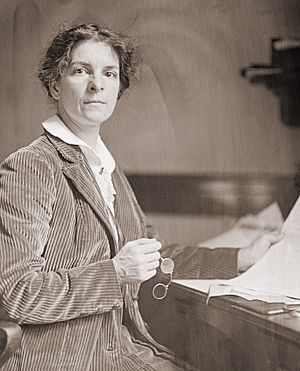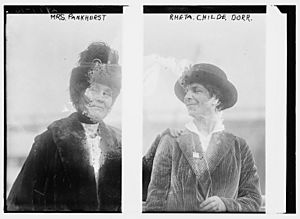Rheta Childe Dorr facts for kids
Quick facts for kids
Rheta Childe Dorr
|
|
|---|---|
 |
|
| Born |
Rheta Louise Child
November 2, 1866 |
| Died | August 8, 1948 (aged 81) |
| Nationality | American |
| Occupation | Author, journalist, and political activist |
| Employer | New York Evening Post, Hampton's Broadway Magazine, New York Evening Mail |
| Spouse(s) | John Pixley Dorr |
Rheta Louise Childe Dorr (1868–1948) was an American journalist, writer, and activist who fought for women's rights. She was known as a "muckraker," which meant she investigated and wrote about unfair social problems during a time called the Progressive Era. Rheta Dorr also became the first editor of an important newspaper called The Suffragist.
Contents
Rheta Childe Dorr's Life Story
Growing Up and Early Life
Rheta Louise Child was born on November 2, 1866, in Omaha, Nebraska. She was one of six children. Her father, Edward Payson Child, was a druggist from New York.
When Rheta was just 12 years old, she and her sister secretly went to hear two famous women, Susan B. Anthony and Elizabeth Cady Stanton, speak about women's suffrage. This meant they talked about women's right to vote. This experience changed Rheta's life. From that day on, she believed strongly that voting was a basic right for everyone.
Rheta studied at the University of Nebraska for two years. In 1890, she moved to New York City to work as a journalist. There, she met John Pixley Dorr, a businessman from Seattle. They got married in 1892 and moved to Seattle to start their family.
Even after getting married, Rheta Dorr kept working as a journalist. She interviewed gold miners coming back from Alaska and wrote articles for New York newspapers. Rheta and her husband had different ideas about women working. In 1898, they separated. Rheta moved back East with her two-year-old son. She had to support herself and her child as a single mother.
Working at the New York Evening Post
In 1902, Rheta Dorr started working at the New York Evening Post newspaper. She wrote special investigative stories and articles about issues important to women. She even worked in factories, mills, and department stores herself. This helped her study the difficult working conditions for women and children.
Rheta was frustrated by how women were treated unfairly at work. In 1927, she remembered her time at the Evening Post: "Even though I was a woman, I could earn a good living, just like a man. I knew this because a very important newspaper in New York wanted me to work for them. It showed great skill to be asked to join their team, especially as a woman. Back then, very few women could get a job at a newspaper. But because I was a woman, I had to accept a salary that was only about half of what my male co-workers earned. I was also told I could never get a raise. The editor explained that women working were just a temporary thing. He thought jobs would eventually go back to men, where they 'belonged'."
She eventually became the paper's "Women's Editor." But she soon realized she couldn't advance further because she was a woman. When she asked about her future at the paper, she was told she had no chance for a higher position. This was partly because her political views were considered too radical for the newspaper.
Fighting for Change: Political Activism

Rheta Dorr left the Evening Post in 1906 and traveled in Europe. There, she became even more interested in the growing worldwide movement for women's right to vote. She continued this work when she returned to America. Dorr wrote investigative stories about the tough lives of working women in cities for Hampton's Broadway Magazine. Many of these articles were put into a book in 1910 called What Eight Million Women Want. This book was very important at the time.
For a short time, Dorr was a member of the Socialist Party of America. She lived in the Lower East Side of New York City. There, she met many immigrants and saw how hard life was for the working class. Rheta Dorr helped striking workers in the clothing industry. She also worked with the Women's Trade Union League to support new laws. These laws included a minimum wage, an 8-hour day, and women's right to vote. Her efforts helped bring together many social reformers. This group pushed for the first major investigation by the U.S. Bureau of Labor into the conditions faced by female workers.
In 1914, Dorr became the first editor of The Suffragist. This was the official newspaper of the Congressional Union for Woman Suffrage. This group later became the National Woman's Party.
Reporting from Europe
Dorr left the Socialist Party because they were against America joining World War I. She believed that a German victory would be a "tyranny." However, she still believed in socialism for a while. She only stopped supporting it in the early 1920s after seeing what happened in revolutionary Russia and Czechoslovakia.
Dorr worked as a reporter in Europe for the New York Evening Mail. Her articles were also published in many other newspapers. Besides her journalism, Dorr wrote two popular books about the situation in Europe. One was about the overthrow of Tsar Nicholas II and was called Inside the Russian Revolution, published in 1917. The other was The Soldier's Mother in France, published in 1918.
After the war, Dorr returned to Washington, DC. She planned to travel across the United States to research articles for magazines. But this plan was cut short. On November 18, 1919, Dorr was hit by a motorcycle. She was hospitalized with a broken arm and other serious injuries. This accident greatly affected her memory and health. It ended the active period of her life.
From 1920, Dorr became involved in Republican Party politics. She worked on the presidential campaign of Warren G. Harding and joined the Women's National Republican Club. Her political views became more conservative as she got older. She traveled to Europe several times to try and get her health back. From these trips, she wrote articles for American newspapers as a foreign correspondent.
In 1922, Dorr helped Anna Vyrubova write her memoir, My Memories of the Russian Court. After that, Dorr wrote her own memoir, A Woman of Fifty, published in 1924. Dorr then wrote a biography of Susan B. Anthony, published in 1928. She finished her publishing work in 1929 with a book about prohibition, which was the ban on alcohol.
Later Years and Legacy
Rheta Dorr had one son, Julian Childe Dorr. He was a United States Consul to Mexico when Herbert Hoover was president. Julian died in Mexico City on September 2, 1936.
Rheta Childe Dorr passed away in New Britain, Pennsylvania, on August 8, 1948. She was 81 years old.
Rheta Childe Dorr's Books
- The Thlinkets of Southeastern Alaska. With Frances Knapp. Chicago: Stone and Kimball, 1896.
- Breaking Into the Human Race. New York: National American Woman Suffrage Association, [c. 1910].
- What Eight Million Women Want. Boston: Small, Maynard & Co., 1910.
- "The Women Did It in Colorado: How the Colorado Women Learned to Vote and the Reforms They Have Worked with their Ballots, Hampton's Magazine, 1911.
- Inside the Russian Revolution. New York: Macmillan, 1917.
- The Soldier's Mother in France. Indianapolis, Bobbs-Merrill Co., 1918.
- A Woman of Fifty. New York: Funk & Wagnalls, 1924.
- "A Convert from Socialism," North American Review, vol. 224, whole no. 837 (Nov. 1927), pp. 498–504. In JSTOR.
- "The Man Who Set Virginia One Hundred Years Ahead: An Interview with Governor Byrd," McClure's, vol. 60, no. 2 (Feb. 1928).
- Susan B. Anthony: The Woman Who Changed the Mind of a Nation. New York: Frederick A. Stokes Co., 1928.
- Drink: Coercion or Control? New York: Frederick A. Stokes Co., 1929.
Images for kids
See also
 In Spanish: Rheta Childe Dorr para niños
In Spanish: Rheta Childe Dorr para niños
 | Kyle Baker |
 | Joseph Yoakum |
 | Laura Wheeler Waring |
 | Henry Ossawa Tanner |


